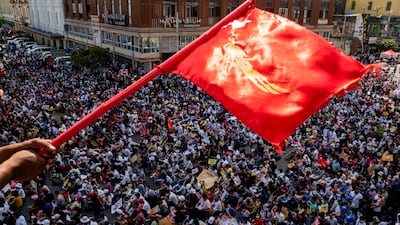Fifteen to 20 villagers, including several teenagers, were killed in some of Myanmar’s deadliest fighting since July between government troops and resistance forces.
The fighting near Gangaw township in the northwestern Magway region started on Thursday, AP reported, citing a villager and reports by independent media. It came two days after a call for a nationwide uprising was issued by the National Unity Government, an opposition that seeks to co-ordinate resistance to military rule.
The fighting broke out when more than 100 troops arrived in four military vehicles to secure the area in Myin Thar and five other nearby villages. Members of a lightly armed village self-defence militia fired warning shots but could not stop the soldiers from entering the area. Clashes continued after.
The opposition movement that rose against the army’s February seizure of power from the elected government of Aung San Suu Kyi was initially peaceful, but gradually began fighting back after security forces used deadly force to break up nonviolent protests.
The National Unity Government’s call on Tuesday for a “people’s defensive war” has received an enthusiastic response on social media, but its actual impact on the ground is hard to measure.
Media sympathetic to the opposition reported an outburst of small-scale shootings and sabotage by the resistance, particularly the toppling of cell phone transmission towers.
But similar activities have been happening for several months and details are difficult to independently verify.
The villager who described the new fighting said at least 11 members of the self-defence group were killed, according to what others in his village told him. Photos of what were described to be their bodies circulated widely on the internet on Friday, and were clear enough to be identifiable to those familiar with them.
“We only have handmade guns and percussion lock firearms,” the villager said. “When it rained, the guns became useless. There are many casualties due to the imbalance in weapons.” Myanmar’s government troops are well-equipped with modern weapons and have access to air and artillery support.
The villager said other residents told him most members of the village’s defence force are youths and that five of those killed were ninth and 10th-grade students. A middle-school teacher was also said to have been killed, the villager said.
Members of the more than 2,000 households in the area had fled to the jungle, he added, while soldiers camped in abandoned homes and at the local Buddhist monastery. Four more people were confirmed dead after fighting broke out again on Friday morning, he said, and an unknown number of houses were burned.
Reports by independent media put the death toll among the villagers at 20 or more. Khit Thit Media, an online news service, said it was told by villagers the dead included seven non-combatants, in addition to the militants.
According to the Assistance Association for Political Prisoners, an independent organisation that keeps detailed tallies of people killed or detained by the military government, there have been 1,058 activists and bystanders killed since February’s army takeover.
The government this week claimed resistance forces have been responsible for the deaths of 933 people, reported Popular News, citing Deputy Home Minister Gen Soe Tint Naing.
In a Thursday briefing for foreign diplomats also attended by the news service, Soe Tint Naing said those killed included security personnel, civil servants and people believed by the resistance to be government informers.
















